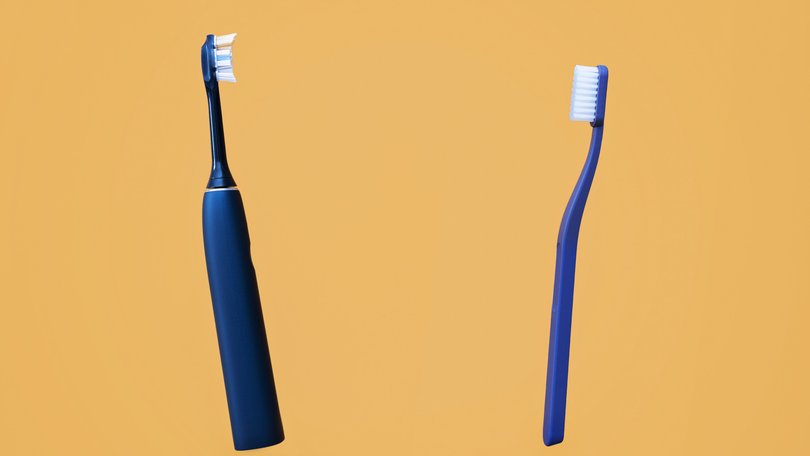Airline toothbrush packing rules: Warnings issued for electric toothbrushes, travel and lithium batteries
It’s an item you wouldn’t want to leave home without when you go on a trip, but if you make this very easy mistake, your toothbrush might get confiscated.

It’s an item you wouldn’t want to leave home without when you go on a trip, but if you make this very easy mistake, your toothbrush might get confiscated.
These days, most electric toothbrushes made by the big dental brands, which are far more expensive than the humble manual toothbrush, have a lithium-ion rechargeable battery.
That lithium-ion battery could lead to your expensive, top-of-the-range dental hygiene product being confiscated by airport security and thrown in the bin.
Earlier in September, the TSA reminded American travellers that they should be putting their electric toothbrush, if it has a lithium-ion battery, in their carry-on.
ROAM. Landing in your inbox weekly.
A digital-first travel magazine. Premium itineraries and adventures, practical information and exclusive offers for the discerning traveller.
By continuing you agree to our Terms and Privacy Policy.“Travelling with your electric toothbrush, or other items that buzz? If they have an installed lithium battery, you should pack them in your carry-on bag,” the TSA wrote on X.
“Any spare or uninstalled lithium batteries must be placed in a carry-on bag.”
In the States, if an electric toothbrush is not correctly packed, it can be confiscated and thrown away.
However, it is not just America where travellers need to think about how they pack their electronic toothbrush.
Qantas and Virgin Australia rules for electronic toothbrush
In Australia, the rules are a little murky.
Both Qantas and Virgin Australia allow electronic toothbrushes to be packed in either checked luggage or carry on.
Under the conditions listed on the Qantas website under “battery powered devices and equipment”, lithium-ion batteries (rechargeable), not exceeding 100Wh must be packed in a way that prevents the on/off switch from being “accidentally activated”.
“Devices containing batteries must have the ON/OFF switch protected to prevent accidental activation, and the device must be completely switched off,” Qantas says.
Qantas adds that “devices containing a lithium-ion battery not exceeding 2.7Wh do not need to be turned off in checked baggage”, however, some electronic toothbrush can exceed 2.7Wh.
For Virgin Australia, an electronic toothbrush is classified as a portable electronic device (PED). The airline’s rules state the device must be “adequately protected against accidental activation” when packed in checked luggage.
“The battery must be securely installed in the portable electronic device (PED),” Virgin Australia says on its website.
“When carried in checked baggage the PED must be switched off (not in hibernation or sleep mode), have the on/off switch adequately protected against accidental activation and the PED must also be protected from damage.
“For example, the PED is packed in original retail packaging, a sturdy box/container or a hard-molded case for items such as power tools, where the on/off switch cannot be accidentally activated.”
So if you are planning on putting an electronic toothbrush in your toiletries bag, make sure it is in a case that prevents the device from being switched on mid-flight and complies with airline requirements, otherwise it could be removed from luggage by airport security.
The advice from TSA comes as lithium batteries continue to cause havoc for airlines and travellers.
Airline portable charger ban
In January 2025, an Air Busan plane was evacuated after flames were seen erupting out of the overhead compartment of the Airbus aircraft.
Still on the ground, passengers were able to quickly escape before flames caused serious damage to the plane.
A rechargeable power bank was found to be the cause of the destructive plane fire.
Following the incident, multiple airlines started banning power banks from flights due to the risk of fire.
Australian airlines have strict rules when it comes to power banks and spare batteries.
“Baggage fitted with non-removable lithium batteries or power banks are forbidden,” Qantas rules state.
“If in checked baggage the lithium battery or lithium power bank must be removed from the bag. The removed lithium battery or powerbank must be in carry-on baggage only.
“Non-lithium batteries/power banks can remain fitted in the bag and carried as carry-on or checked baggage.”
The Virgin Australia website says: “Spare/loose batteries (including power banks/packs must be in carry-on baggage only and must be protected against short circuit by, placing in its original retail packaging, placing each battery in a separate plastic bag or protective pouch or insulating terminals by taping over exposed terminals.”
From March 1, passengers travelling with Eva Air and China Airlines were forced to comply with new power bank restrictions.
“Effective March 1, 2025, to ensure flight safety, the use and charging of power banks and spare lithium batteries will be prohibited throughout the flight,” an Eva Air statement said before the ban started.
“Please note that power banks and spare lithium batteries are prohibited in checked baggage.
“They must be carried in your carry-on baggage and properly stored to prevent compression or damage.”
Later in March, Singapore Airlines banned power banks from being used on flights, in addition to having packing restrictions.
“Effective 1st April 2025, Singapore Airlines customers will not be allowed to charge portable power banks via the onboard USB ports, or use power banks to charge their personal devices, throughout the duration of the flight,” the airline said in a statement.
“This means power banks must be carried in cabin baggage on all SIA flights and are not permitted in checked baggage. Customers may bring power banks with a capacity of up to 100Wh without special approval, while those between 100Wh and 160Wh require airline approval.
“We seek customers’ understanding that safety will always be our top priority.”
